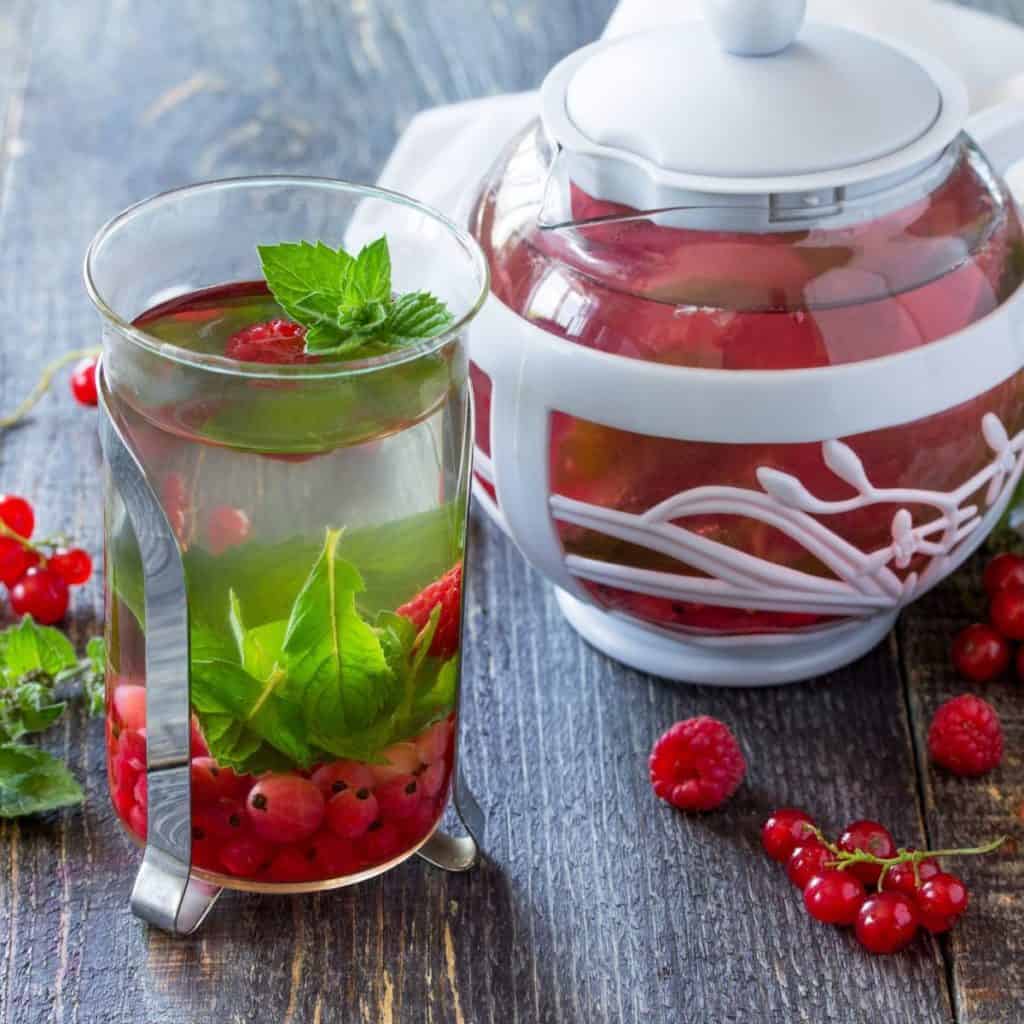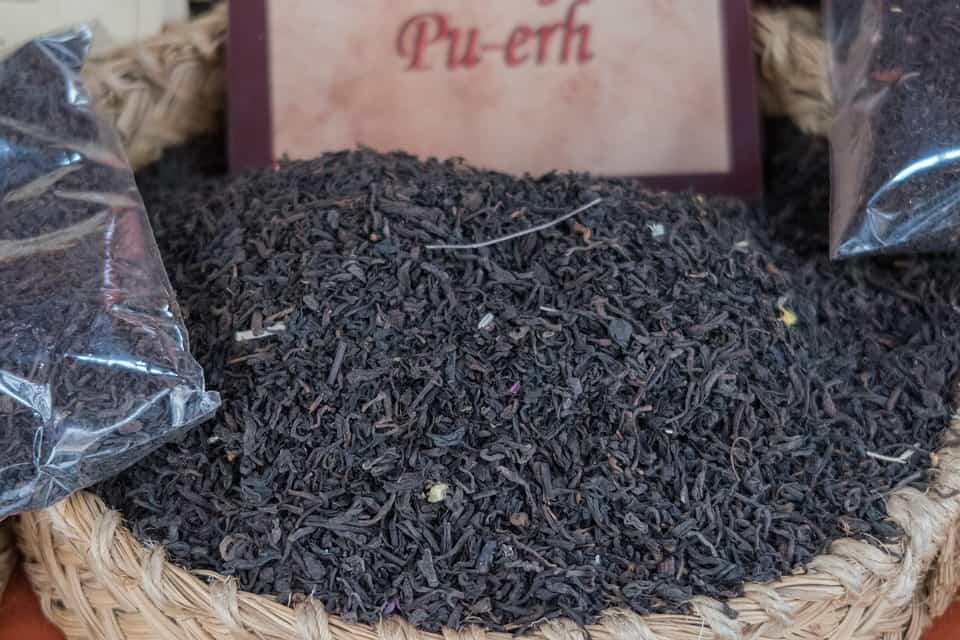For centuries, raspberry leaf tea has been regarded as a popular herb which is highly beneficial for women.
In the field of women’s health, some raspberry leaf tea benefits include easing menstrual pain and reducing the risk of some pregnancy problems.
Moreover, the raspberry leaf itself provides several major benefits for your health in general. All of them become the main reason why this herbal tea is popular among tea drinkers.
Facts about Raspberry Leaf Tea

Widely known as red raspberry leaf, this herbal evergreen actually comes from a raspberry plant (Rubus idaeus). The plant is originated from the western countries, primarily in Europe.
However, in later periods, the raspberry plant is also cultivated in some American countries.
Belongs to the group of tropical evergreens, the raspberry plant grows largely in mountainous areas, especially in rocky surfaces.
As you probably know, the plant bears edible fruits which can be eaten raw or turned into jam. Ripe raspberry fruits have red shade, soft texture, and slightly sour taste.
Meanwhile, the leaves feature subtle silver lining and delicate hairs on their green surface.
Compared to the popular chamomile tea, raspberry leaf tea has a bolder, yet sweeter taste. Raspberry leaf tea has quite similar flavor to some other kinds of fruit-base tea, such as Earl Grey, hibiscus, and rose hips.
You can easily taste both fruity and earthy flavor while sipping a cup of this herbal tea.
Raspberry Leaf Tea Health Benefits for Women
Raspberry leaf tea benefits have been researched for decades within the scope of both the medical and pharmaceutical fields.
The results of those long-term studies mostly point out that the healing ability of this herbal tea is linked to women’s health.
For this reason, a raspberry leaf tea is often called as a women remedy since it can overcome some particular problems that are only experienced by women.
Here are several benefits of raspberry leaf that can help women deal with their health problems.
1. Reducing the risk of anemia during the menstrual period

Raspberry leaves are loaded with iron which is highly beneficial for keeping you at the best condition during menstrual periods.
For starters, it can prevent women with heavy periods from getting anemia. In addition, it reduces some menstrual effects, including fatigue and petulance.
2. Easing menstrual pains and cramps

One of the main compounds in raspberry leaf is a substance called fragarine. This substance has the ability to regulate uterine activity in a woman’s body.
Therefore, if you drink raspberry leaf tea during the menstrual period, there are good chances that the tea will ease any pain and cramp you usually feel.
A medical study even suggests that raspberry leaf tea can reduce nausea that is known as another symptom of pre-menstrual syndromes.
3. Controlling the bowel movements of pregnant women

Fragarine compounds in raspberry leaf are not only beneficial for menstruating women, but also for the ladies who are expecting.
In pregnant women, fragarine works by regulating bowel movements as well as tightening the muscles in the pelvic region. As a result, the urge to urinate will be controlled at a balanced level.
This is one of the main reasons why drinking raspberry leaf tea during pregnancy is advisable for women.
4. Shortening the duration of labor

Raspberry leaf tea is often recommended by midwives and health practitioners because of its ability to shorten labor duration.
One of the studies in the Austrian College of Midwives supports this result after experimenting with 108 mothers during their labor.
As suggested by the study, mothers who drink raspberry leaf tea on a regular basis experience labor easier and in a shorter time. They also avoid the risk of getting C-section.
5. Preventing bad risk during childbirth

Known as a uterine tonic, raspberry leaf tea can strengthen the muscles in the uterus that will be useful during the childbirth process.
Besides experiencing easier labor, mothers who drink this herbal tea during their pregnancy can avoid the risk of childbirth complications. These include eclampsia and excessive bleeding.
6. Serving as an additional source of nutrients for breastfeeding

Raspberry leaf tea is rich in vitamins and minerals, including vitamins C, E, B complex, potassium, calcium, magnesium, and phosphorus. All of them are beneficial for breastfeeding women in the early postpartum period.
The nutrients of this herbal tea can also lessen postpartum bleeding in some cases.
How to Make Raspberry Leaf Tea

Raspberry leaf tea can be found in many forms. If you like everything organic and have a fruit garden, you can grow raspberry plant on your own.
When the harvesting time comes, all you have to do is pluck the leaves directly from the plant and turn them into organic raspberry leaf tea.
Meanwhile, for those who prefer more practical ways, raspberry leaf tea can be found in the form of tea bags or loose leaves package.
Both of them are available in the grocery stores, herbal food stores, even in the online marketplace.
Regardless of the form you choose, there are some important tips to keep in mind when making raspberry leaf tea.
- Use around 6-8 ounce of boiling water for a teabag or a teaspoon of dried raspberry leaves.
- To get the best flavor, the tea should be steeped for 10-15 minutes.
- If you want more advance raspberry tea recipe, add honey and lemon to enhance the flavor.
- The tea can be refrigerated up to seven days, but the taste may lose its boldness.
- You can also add other types of herbs, such as chamomile, to get calming and relaxing effects.
Raspberry Leaf Tea Side Effects

Raspberry leaf tea benefits for pregnant women are plenty, but there are some side effects that should be taken into account.
In some cases, excessive consumption of raspberry tea may induce infrequent, uncomfortable contraction in the second and third trimester. This occurrence is called “false labor” or Braxton Hicks Syndrome.
Moreover, if you drink raspberry leaf tea more than three cups per day, another side effect that may come up is gastrointestinal upset. This effect is usually indicated by nausea, vomiting, and even diarrhea.
To avoid those side effects, what you need to do is limit the daily intake of raspberry leaf tea. One to two cups per day should be enough to keep you safe.
Additionally, pregnant ladies must avoid drinking the tea in the early stage of pregnancy or during the first trimester. It is better to consume raspberry leaf tea in the last trimester, especially two weeks before the due date.
Read More :



